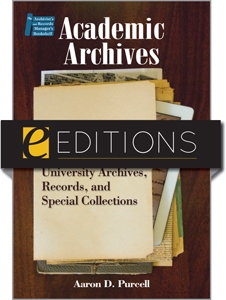
Academic Archives: Managing the Next Generation of College and University Archives, Records, and Special Collections--eEditions e-book
The download link for this product can be found on the final confirmation screen after you complete your purchase, and may also be accessed from your Account Profile. For more information about ALA eEditions file types and how to view them on eReaders, desktop computers, and other devices, see this page.
Primary tabs
You don't need to be an ALA Member to purchase from the ALA Store, but you'll be asked to create an online account/profile during the checkout to proceed. This Web Account is for both Members and non-Members.
If you are Tax-Exempt, please verify that your account is currently set up as exempt before placing your order, as our new fulfillment center will need current documentation. Learn how to verify here.
- Description
- Table of Contents
- About the author
- Reviews
Today, the field of academic archives is more expansive and complex than ever before. In addition to college and university archives, academic archives encompass records management programs, special collections departments, and other campus archival repositories. This new definition of academic archives programs has redefined the role, and training, of academic archivists. This book gives you the tools to fill that role, including collection strategies, a management plan for electronic records, and development strategies for starting a campus records management program, and an understanding of the emerging trends affecting all archivists.
Academic Archives is designed to appeal to archivists of all ranks and experience, archivists working both inside and outside of academic libraries, archivists in training, other information professionals, library directors, and members of the academic community. If you want to start an archives program, update an existing archives program, begin a career in academic archives, or remain current on recent developments, you'll find valuable advice in this timely addition to the Archivist's and Records Manager's Bookshelf Series.
Chapter 1: The Path to Academic ArchivesChapter 2: The Mission of College and University Libraries and Academic ArchivesChapter 3: Special Collections and Academic ArchivesChapter 4: Mission and Vision BuildingChapter 5: Records ManagementChapter 6: Collection DevelopmentChapter 7: Acquiring, Processing, and Managing CollectionsChapter 8: Public and Research ServicesChapter 9: Digital Frontiers and Electronic ChallengesChapter 10: Emerging Trends and the Horizon
Aaron D. Purcell
Aaron D. Purcell is professor and director of special collections at Virginia Tech. He earned his Ph.D. in history from the University of Tennessee, his master's of library science from the University of Maryland, College Park, and his master's degree in history from the University of Louisville. Purcell has also worked at the National Archives and Records Administration, the National Library of Medicine, and the University of Tennessee.
Purcell is an active scholar, writing in the fields of history and archives. The University of Tennessee Press published his first academic book, White Collar Radicals: TVA's Knoxville Fifteen, the New Deal, and the McCarthy Era, in 2009. Purcell is completing an edited book on New Deal and Great Depression historiography for Kent State University Press, he is the editor of The Journal of East Tennessee History, and he is finishing a book on Arthur E. Morgan, the first chairman of the Tennessee Valley Authority.He has written articles on archival topics for the American Archivist, Archival Outlook, IMJ, and the Journal of Archival Organization. Purcell is an active member of the Society of American Archivists, the Mid-Atlantic Regional Archives Conference, and the Southern Historical Association.
"With good leadership, planning, and proper assessment, the recommendations in this book are scalable and within reach of any archives ... Purcell's style is not overly technical but it is comprehensive. For those of us already moving forward, it is an excellent reference to help us gauge the efficacy of our archives programs and to identify gaps that need to be reconciled. For those new to archives, it is essential reading that represents the progressive directives now recognized within the archives profession ... informative enough to steer us toward asking the right questions and harnessing the necessary expertise already on our campuses."
--Archival Issues


